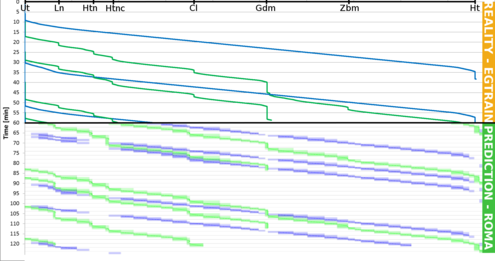Optimization in Railway Traffic Control and Public Transport Systems
Railway timetables are developed to make operations robust and resilient to small delays. However, disturbances perturb the daily plan, and dispatchers adjust the plan to keep operations feasible and to limit delay propagation. Rescheduling approaches aim at updating the offline timetable at best, in the presence of delays.
In fact, a key factor for the limited share of railway and public transport is their ( perceived insufficient) reliability. In the European Communities, around the year 2000, around 57% of rail users said to be satisfied with the service provided. The quality of service of the Dutch railway system was relatively low around the year 2000, with less than 80% of trains arriving at major stations within 3 minutes of delay. The current target set by the contract of service with the Government requires a punctuality level of at least 87%; the major transportation stakeholders operating in the Netherlands are now targeting a punctuality level goal of 95% to be reached within year 2015. Those figures are believed impossible to be reached without intelligent railway traffic control during delays and disrupted operations.

Many directions of research are still open on this wide field:
Study of closed loop approaches: If one really puts an automated traffic control system into practice, how will it perform? Are there issues related to stability, performance, quality, reliability, robustness, when not all information is precise and correct?
Influence of human factors during disruption management: trying to understand how human traffic controller take decisions under uncertainty and vague qualitative requirements.
Developing algorithms that include passenger flows in the optimization problem, and just not delays of trains
Study dynamics of uncertainty in railways: As delay are the main source of rescheduling actions, how do delays originate, and propagate?
This work is partially funded by the State Key Laboratory of Rail Traffic Control and Safety (contract No RCS2012K004), Beijing Jiaotong University and the EU-FP7 project ON-TIME (www.ontime-project.eu).
For more information, please contact Dr. Ir. Francesco Corman, f.corman@tudelft.nl